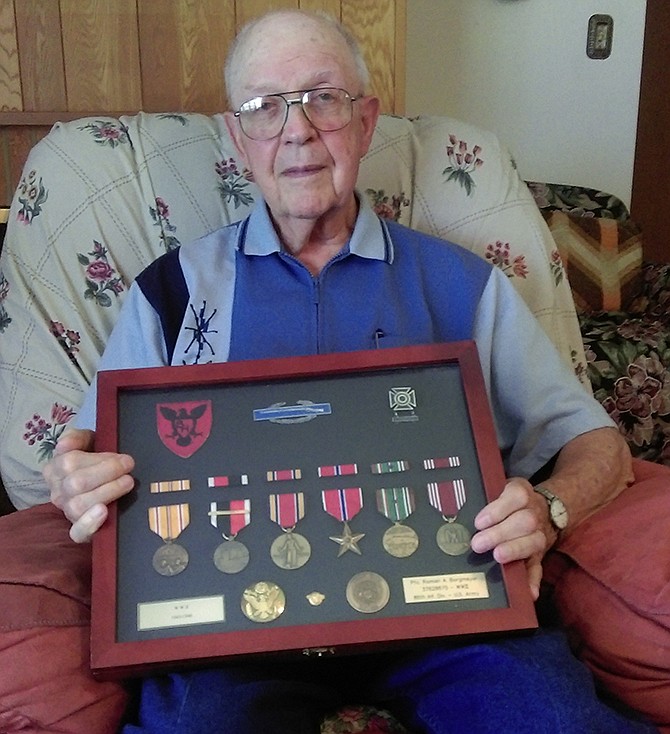The First World War mushroomed into a major overseas commitment for the United States, leading to the implementation of the Selective Service Act in 1917, which resulted in 2.8 million men being drafted into military service.
Following the armistice, soldiers returned from the war and most went on to pursue careers, marry and raise children. These brave warriors likely never thought, many years after storing away their military uniforms, a new draft would be necessary, thus enlisting the service of their children.
"My dad served in the Army during World War I and took part in five major campaigns," beamed Roman Borgmeyer, 89, Jefferson City, while pointing to a black and white picture of his father in his Army uniform.
Returning from the war, the elder Borgmeyer later became a farmer. However, a few years after finishing his education in rural Osage County, the son followed the father's example when receiving his own draft notice in the mail.
"My notice came in November 1943," the younger Borgmeyer clearly recalled. "I knew it was coming; everybody else around my age was getting theirs." He added, "I figured they would get me too. ... it was simply a matter of time."
Within three weeks, the draftee was in Camp Blanding, Florida, for basic training, an event, he solemnly recalled, that was extended by six weeks as he lay in the camp hospital with "some kind of fever."
In the mid-spring of 1944, Borgmeyer traveled to a training site near San Diego, California, and was attached to the 86th Infantry Division, completing several months of amphibious training alongside the Marine Corps and preparing for what he believed to be assaults on Japanese-held positions in the Pacific.
"That's when the war (in Europe) started to get hot," he said. "They loaded the division on a train and sent us to Boston, and then," he continued, "we all boarded a troop ship bound for France."
When the division arrived in port at La Havre, France, in early March 1945, they were placed on railcars and traveled east, eventually transitioning to trucks and arriving at the Rhine River where they helped relieve the battle-weary 82nd Airborne Division.
"We dug in along the Rhine for about a week," he recalled. "There was a sniper on a sunken barge in the middle of the river. ... he almost got me. But the company sent a patrol over one night and they got him off of there," he wryly added.
Borgmeyer served as a "BAR (Browning Automatic Rifle) man"- the assistant gunner for a three-man team assigned to the .30 caliber machine gun.
"It was a great weapon ... very destructive," he said.
The 86th Division soon "hooked up" with General Patton's Third Army and fought their way south through Germany, eventually reaching Austria near the "Eagle's Nest"- Hitler's mountain hideaway near the town of Berchtesgaden in the Bavarian Alps.
With the war in Europe ending, the division returned to the United States in June 1945, thus concluding a period of service that earned Borgmeyer three Battle Stars and a Bronze Star for "meritorious achievement in ground combat against the armed enemy ..."
Yet as the young soldier would soon discover, the war continued to rage in the Pacific and would necessitate extended service from many of the soldiers who had served in the European theater, especially those who already possessed amphibious training.
"I didn't have enough points to get out, so after 30 days of leave and some time at camp in Oklahoma, they sent us back to California and we boarded a troopship for the Philippines to prepare for the invasion of mainland Japan."
While in transit to his new duty assignment, he learned of the Japanese surrender aboard the U.S.S. Missouri, an event that provided the division with great relief but did not herald an end to their military service.
"We were all glad we didn't have to invade Japan, because I don't think that I would be here now if that had happened," he solemnly asserted.
For the next six months, Borgmeyer remained on the Philippine island of Luzon, during which he helped oversee Japanese prisoners of war placed on various work details.
In April 1946, he returned to the United States and was discharged from the Army at Ft. Leavenworth, Kansas. In later years, he married his wife, Hazel (who has since passed), moved to Jefferson City, and went on to enjoy a 34-year career as a city bus driver.
As the son of a World War I veteran explained, although his own time in uniform had its share of "close calls," these incidents have helped him understand the history he became a part of was anything but futile.
"It was some pretty tough times back then," he said. "I can remember one time when a guy that was standing just a few feet from me was shot in the chest by a German sniper - there were a lot of close calls like that, you better believe!
"But I'm glad I was there and didn't get wounded. ... I was lucky," he continued. "And I hope that my story can help preserve a little of that history, to show that what we did wasn't in vain because we all helped put ol' Hitler out of business," he grinned.
Jeremy P. Ämick writes on behalf of the Silver Star Families of America.

